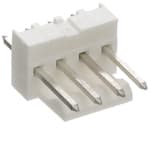Connectors
The importance of connectors can sometimes be overlooked because of their simple function in comparison to more active products. However, these fundamental components are often a sophisticated blend of materials that satisfy the strictest requirements, such as shell materials for military and aerospace circular connectors or the variety of contact platings for termination.
Electronic connectors play a crucial role across a wide variety of industries, and RS is proud to offer the best connectors on the market from major brands like Amphenol, Harting, Molex, Phoenix Contact, TE Connectivity, and our own brand RS PRO.
Read on for more information on the various types of connectors, how they work, and what they can be used for.
What are connectors?
Connectors enable two components or devices to be joined together to complete an electrical circuit. They typically consist of two major parts – the male component known as the plug which connects to the female component known as the socket. When this connection is made, a continuous path is formed that allows the current to flow.
As essential components, connectors can be found in almost every piece of electronic equipment. They come in many different forms and cover a wide range of uses, and choosing the right one will depend on a number of specifications.
For example, there are physical differences, such as the number of contacts, the contact pitch (the distance between the pins or terminals in a connector), and the material used (such as bronze, copper, or brass).
There are also performance specifications to consider, such as the amount of current or voltage a connector can cope with, as well as its maximum operating temperature.
How do connectors work?
The basic function of connectors is to complete an electrical circuit by joining two or more devices or components. This is achieved by inserting the pins from the male part into the sockets of the female part. However, different types of connectors do this in slightly different ways.
For example, binding post connectors join bare wires to posts and fix them with clamps or screws, whereas in a terminal block, several wires are connected to one terminal point which is encased in housing. Other methods of connection include plug and socket, rack and panel, and blade, all of which are suitable for different applications, depending on the specific operating requirements.
What are connectors used for?
Electronic connectors can be found in almost every device or piece of equipment. For example automotive connectors are used in car manufacturing, and assist the operation of the air conditioning, sound system, windows, headlights, and anything else that requires an electrical connection.
Wire connectors, meanwhile, can be found in electrical boxes (where multiple wires are likely to be present) to prevent contact with other wires and the potential for a hazardous short circuit. These are often found in security systems, lighting, and signage among many other applications.
There are also dozens of different network connectors, which are used in the production of computers, laptops, routers, and other telecommunications devices.
What are the different types of connectors?
At RS, we have a wide range of connectors designed to meet various requirements. You can browse our full selection below, and some of our products include:
- Audio and video connectors for carrying audio and video signals, including power jacks, XLR connectors, HDMI connectors, RCA connectors and more.
- Automation connectors, which are widely used in a variety of industrial settings, including power stations and manufacturing plants. These types of connectors are increasingly in demand as they can help to improve efficiency and safety as well as reduce labor costs.
- Coaxial/RF connectors. Used to connect coaxial cables. These cables and the associated connectors transmit radio frequency signals and are found in televisions, CCTV systems, and for internet connections.
- Ethernet connectors, which are typically found in telecommunications and data equipment. RJ45 connectors are the most common type of ethernet connector.
- D-sub connectors. Taking their name from their D-shaped metal shield, they are commonly used to create connections on a circuit board in computing applications.
Why choose RS for your connectors?
We stock thousands of electronic plugs, wire connectors, network connectors and more from leading brands, such as Harting, Amphenol, TE Connectivity, Altech, and Phoenix Contact. We’re one of the largest distributors of electronic equipment in North America and all of our products meet the very highest industry standards.
You can filter our vast collection by manufacturer or by type of connector. Or if you already know which product you need, you can search directly by name or number. Of course, if you have any questions about our connectors then please don’t hesitate to get in touch or seek further advice and guidance from our comprehensive expert hub.









